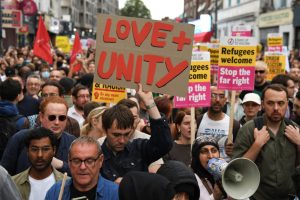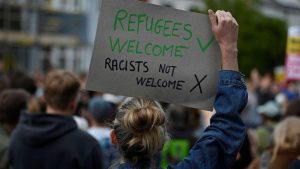Thousands of anti-racism protesters took to the streets of several English cities on Wednesday, to counter days of far-right violence that have kept British police on alert.
Nightly riots, which have included attacks on mosques and migrant-related facilities, have broken out in cities across England and Northern Ireland. The unrest was fueled by misinformation surrounding the killing of three children on July 29.
Anti-racist and anti-fascist protesters held rallies in cities across England on Wednesday evening, including London, Birmingham, Bristol, Liverpool and Newcastle.
“Which streets?” Our streets! » chanted protesters at a rally in Walthamstow, north-east London, where some held banners saying “Stop the far right”.
“I live in the neighborhood and we don’t want these people in our streets (…) they don’t represent us,” said Sara Tresilian, 58, referring to the far right. “You need to come (and) deliver this message … I think it’s important that you be there for your friends and your neighbors.”
Andy Valentine, Deputy Assistant Commissioner of the Met Police, thanked “communities for coming together across the capital and showing community spirit this evening”.
In Sheffield, activists chanted “Say it loud, say it clear, refugees are welcome here”, as riot police looked on.
In Birmingham, hundreds of anti-racism protesters gathered outside a migrant support center, while in Brighton around 2,000 people took part in a peaceful demonstration, according to police.
There were tensions in the southern town of Aldershot, where police had to intervene between anti-racism activists and a group of people shouting “Stop the boats” – a reference to migrants crossing the English Channel to Britain.
The government had put 6,000 specialized police officers on alert to manage the hundred demonstrations by far-right activists and counter-protesters.
Home Secretary Yvette Cooper thanked “all the police officers working tonight to protect and support local communities” in a social media post.
Courts and consequences
Courts have begun handing out prison sentences to offenders involved in the unrest, as authorities try to prevent further violence.
The unrest, the worst Britain has seen since the London riots in 2011, resulted in nearly 430 arrests and at least 120 charges. Several countries have issued travel warnings for the UK due to ongoing violence.
The riots began after three girls aged nine, seven and six were killed and five other children were seriously injured in a knife attack at a Taylor Swift-themed dance class in Southport, in the northwest of England.
False rumors on social media suggested the attacker was a Muslim asylum seeker. The suspect was later identified as Axel Rudakubana, 17, born in Wales and of Rwandan parents.
Following the incident, protesters threw bricks and flares at police officers, set cars on fire and attacked mosques and at least two hotels housing asylum seekers.
Prime Minister Keir Starmer warned that anyone involved would face “the full force of the law”, including those inciting violence online. Starmer, a former attorney general, promised “substantial convictions before the end of this week” for the rioters and announced an additional 500 prison places.
Many defendants, including teenagers, have already appeared before the judges. A man was jailed for three years on Wednesday after pleading guilty to violent disorder and assaulting a police officer in Southport.
Two other men were sentenced to 20 and 30 months for taking part in violence in Liverpool on Saturday.
“The three men sentenced today are just the tip of the iceberg and only the beginning of what will be a very painful process for many of those who foolishly chose to become involved in violent unrest,” said the prosecutor Jonathan Egan.

A far-right group involved
Police attributed the unrest to figures associated with the now-defunct English Defense League (EDL), a far-right Islamophobic organization whose supporters have been linked to football hooliganism.
EDL founder Tommy Robinson has been accused of stoking tensions. Police in Cyprus, where Robinson is believed to be on holiday, said they were ready to assist British police if necessary. However, Robinson later wrote on social media: “Luckily I’m not in Cyprus then.”
The rallies were promoted on far-right social media under the slogan “Enough is enough.”
British lawmakers have accused social media sites of fueling the violence. Tech billionaire and X owner Elon Musk, in particular, has angered the government with a series of provocative tweets, including one claiming that a “British civil war is inevitable.”

To stay updated, visit and follow our Facebook page or website
